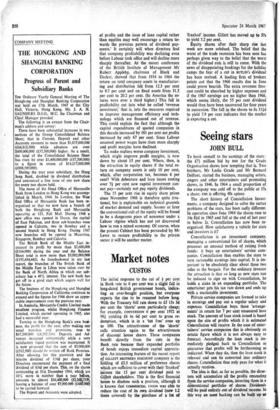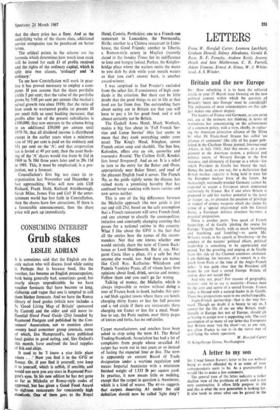Seeing stars
JOHN BULL
To hook oneself to the earnings of the stars: the £71- million bid by EMI for the Grade Organisation shows how tempting that is. Two brothers, Mr Leslie Grade and Mr Bernard Delfont, started the business, managing actors, singers and other entertainers and promoting shows, in 1946. In 1964 a small proportion of the company was sold off to the public at 15s a share; EMI is offering 40s apiece.
The short history of Constellation Invest- ments, a company designed to solve the surtax problems of the stars, has been sadly different. In operation since June 1964 the shares rose to 14s 8fd in 1965 and fell at the end of last year to below 2s. Constellation has now been re- organised. How satisfactory a vehicle for stars and investors is it?
Constellation is an investment company, managing a conventional list of shares, which possesses an unusual method of raising fresh funds: it buys up entertainers' service com- panies. Constellation thus enables the stars to turn surtaxable earnings into capital. It is im- portant to be absolutely clear about these two sides to the bargain. For the ordinary investor the attraction is that so long as new stars can be induced to sign on with Constellation, he holds a stake in an expanding portfolio. The entertainer gets his tax rate down and ends up with a marketable investment.
Private service companies are formed to take in earnings and pay out a regular salary and expenses. Constellation buys these `arrange- ments' in return for 7 per cent unsecured loan stock. The amount of loan stock issued is based upon the size of profits which it is estimated Constellation will receive. In the case of enter- tainers' service companies this is obviously an erratic figure which it is not always easy to forecast. Accordingly the loan stock is im- mediately pledged back to Constellation as guarantee that profits will be forthcoming as indicated. When they do, then the loan stock is released and can be converted into ordinary shares. Constellation thus only pays for what it actually receives.
The idea is that, as far as possible, the direc- tors will accumulate all the profits emanating from the service companies, investing them in a conventional portfolio of shares. Dividends will be paid entirely out of dividend income. In this way an asset backing can be built up so
that the share price has a floor. And as the underlying value of the shares rises, additional service companies can be purchased on better terms.
The critical points in the scheme are the formula which determines how much loan stock will be issued for each £1 of profits received and the rights of the ordinary capital, which is split into two classes, 'ordinary' and 'A ordinary.'
To see how Constellation will work in prac- tice it has proved necessary to employ a com- puter. If you assume that the share portfolio yields 5 per cent; that the value of the portfolio grows by 3.68 per cent per annum (the market's actual growth rate since 1919); that the ratio of loan stock to warranted profits (at present 10 per cent) falls as asset backing increases; that profits after tax of the present subsidiaries is £100,000; that new entrants to the scheme bring in an additional £50,000 per annum until 1975-76; that all dividend income is distributed except in the earlier years when a minimum rate of 161 per cent is paid on the ordinary and 331 per cent on the `A'; and that corporation
tax is levied at 40 per cent, then the asset back- ing of the `A' shares would rise from 4s Ild in 1969 to 7s 10d three years later and to 20s 1 id in 1981. This, it must be emphasised, is a pro- jection, not a forecast.
Constellation's first big test since its re- organisation last November and December is fast approaching. Who will now join Cliff Richard, Frank Ifield, Richard Attenborough, Sarah Miles, James Fox and Co? If the enter- tainment world has lost faith in Constellation, then the shares have few attractions. If there is a favourable announcement, then the share price will perk up immediately.



































 Previous page
Previous page